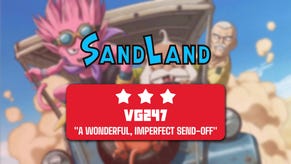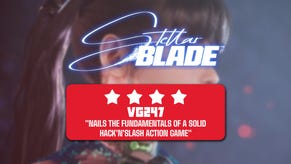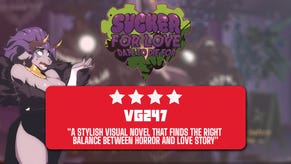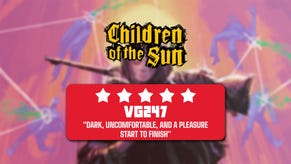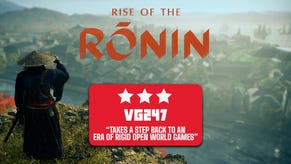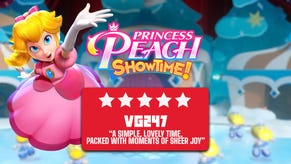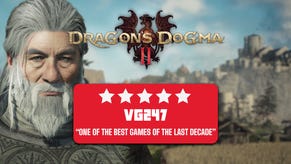Dragon Quest Heroes: The World Tree's Woe and the Blight Below PlayStation 4 Review: Passion Project
Omega Force once again takes the reins of a classic franchise.
This article first appeared on USgamer, a partner publication of VG247. Some content, such as this article, has been migrated to VG247 for posterity after USgamer's closure - but it has not been edited or further vetted by the VG247 team.
You can't deny Omega Force's passion for the games they work on. When they were working on Hyrule Warriors, Shigeru Miyamoto actually had to admonish them not to adhere so slavishly to the source material. In the case of Dragon Quest Heroes, though, they hew much more closely to the style of the original work, even replacing the traditional "Warriors" title to signify the difference. That said, Omega Force's influence on the design remains quite apparent.
From the very beginning, Dragon Quest Heroes is at pains to feel like a proper entry in the series, utilizing the familiar Akira Toriyama art, rousing soundtrack, and 16-bit sound effects that have become a part of the series's tradition. Dragon Quest has always had a particular feel to it, which I would describe as "epic fairy tale," and Dragon Quest Heroes captures that feeling very well. This is not surprising given that they would have been exoriated in Japan if they hadn't. Just ask Level-5 what happens when you go against Dragon Quest's tradition.
There's more to making a decent spinoff than merely capturing the aesthetics, though, and happily, Omega Force mostly succeeds on that front as well. Yes, Dragon Quest Heroes is another musou game, which is to say that its centers around hacking and slashing through waves of enemies. But Omega Force's approach with Dragon Quest Heroes does much to smooth out an otherwise choppy experience and give the series the trappings of an RPG, however superficial those trappings might be.
When the story begins, Luceus and Aurora - a male and female knight created for Dragon Quest Heroes - find themselves in the midst of a sudden and violent monster uprising. Determined to discover why the formerly placid monsters have gone rogue, the pair team with characters from throughout the Dragon Quest universe, including Dragon Quest IV's Aliena, Dragon Quest V's Bianca, and a number of other familiar faces. Soon enough they gain access to an airship, allowing them to travel from region to region as they work to quell the monster uprising. It's certainly not as in-depth or emotional as the average Dragon Quest story, serving mainly as an excuse for fighting the franchise's iconic monsters, but the crossover character are certainly welcome.

As the story progresses, many of the missions in Dragon Quest Heroes revolve around protecting an objective of some sort, giving it a kind of tower defense vibe. Monsters emerge from portals opened by Mawkeepers and proceed down separate lanes toward your objective, which can be defended with friendly monsters spawned by tokens earned from defeating enemies. Other missions are gauntlets in which you battle down a road or through a building toward a particular objective.
I'll grant that this approach probably doesn't sound particularly ambitious; but in this instance, it's helpful in streamlining the usual formula and putting more of an emphasis on the combat, such as it is. It's not nearly as messy as, say, Dynasty Warriors Gundam, in which you spend most of your time running around a poorly-defined map trying to hold capture points. And while a creeping sense of repetition sets in rather quickly, it's partly mitigated by the pace of the missions, which are usually over rather quickly.
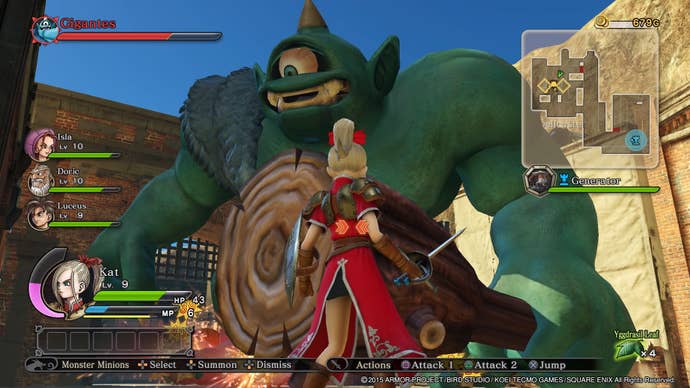
Unfortunately, there's one way in which Dragon Quest Heroes compares unfavorably to its predecessors, and that's in its lack of multiplayer or additional modes. Dragon Quest, of course, is an RPG, so it's not typically associated with multiplayer (though Dragon Quest IX certainly had some excellent co-op elements), but its absence is glaring in light of the history of Dynasty Warriors. In this instance, Dragon Quest Heroes's focus on its story mode may actually be slightly to its detriment. It appears we'll have to wait for the sequel in that regard.
Thankfully, one thing that Omega Force does get right is the presentation. The Dynasty Warriors games I've played have traditionally had rather basic production values, but Dragon Quest Heroes goes the extra mile with its story segments, featuring actual in-engine cutscenes rather than the usual cutouts over text boxes - an approach that goes a long way toward making it feel more like an RPG. What's more, the hub where you shop, craft items, and set your party is an actual explorable area rather than a basic menu. They've even included the familiar altar where you can save your game.
Elements like these may not matter a huge amount in the grand scheme of things, but they go a long way toward elevating the overall experience and lending it the flavor of a Dragon Quest game. It's one example in which Omega Force has clearly gone the extra mile with this game, much as they did with Hyrule Warriors - another rather strong musou game.
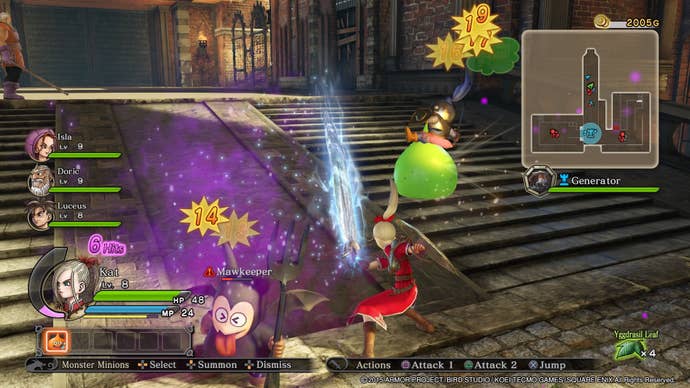
Of course, having the flavor of a Dragon Quest game and actually being a Dragon Quest game are two different things, and even a sprinkling of RPG elements isn't really enough to make Dragon Quest Heroes more than a bog standard brawler. You get a horizontal strike, a vertical strike, and a handful of magical attacks, with different button combinations comboing into more powerful crowd-clearing attacks. Every character has their own strengths and weaknesses - Isla is a ranged attacker while Doric is a pure brawler, for example - but there's not a lot of nuance to the combat outside of knowing when to roll around. If you get into real trouble, you can always activate your tension gauge, which will allow you to go Super Saiyan for a time before unleashing a powerful area of effect attack. Even the bosses, which range from the first game's dragon to the familiar blue Gigantes, can be button mashed into oblivion with some well-timed rolls mixed in.
In the spirit of the source material, though, there are at least some attempts to lend some depth to the combat. Characters earn skill points during missions, which can in turn be used to open up new attacks or upgrade stats. There's also a basic weapons and armor shop. You can even craft items out of the ingredients you find and upgrade their effects by merging them together, granting stat boosts and other elements. But nice as it is that these elements exist, Dragon Quest Heroes is what it is - a fairly simple hack-and-slash brawler. There's not much Omega Force can do to elevate it beyond that. The formula itself is built around a certain amount of mindless repetition.

Within the confines of a musou game, however, I was surprised how much I ended up enjoying Dragon Quest Heroes. I've played musou games on and off through the years, but they've never struck me as being more than a distraction - something to play when you need to blow off steam without thinking too much. Dragon Quest Heroes mostly fits within that mold, but its fidelity to the source material, its strong presentation, and its more focused objectives make it more enjoyable than other games in the series.
In that light, I find it surprisingly easy to recommend as a light but fun action game that doubles as a nice tribute to Dragon Quest, soundtrack and all. I never thought I'd say this, but I hope Omega Force continues working on these sorts of passion projects. With Hyrule Warriors and now Dragon Quest Heroes, they've done their best work in years.
InterfaceThe menus are very reminiscent of Dragon Quest, and the fully-animated hub is a nice touch. They really went the extra mile in that regard.
Lasting AppealDragon Quest Heroes includes a New Game Plus and the ability to take on more powerful versions of existing bosses for special gear and other rewards, giving it a small bump in the lasting appeal department.
SoundDragon Quest's familiar sound effects and themes make a welcome appearance. I'm glad Omega Force didn't overthink this element.
VisualsDragon Quest Heroes is a marked improvement from previous projects. The move to the PlayStation 4 has clearly been beneficial for Omega Force.
ConclusionThere are so many ways that Dragon Quest Heroes could have gone wrong. Thankfully, Omega Force does right by the classic franchise, and they take the opportunity to streamline their own formula as well. The story could have been better, and the repetitive gameplay comes close to wearing out its welcome, but otherwise Dragon Quest Heroes counts as another win for Omega Force.



